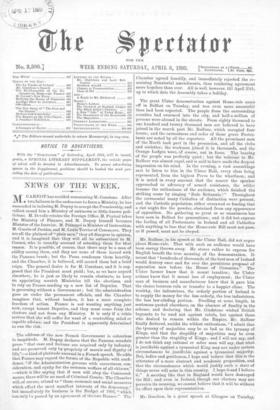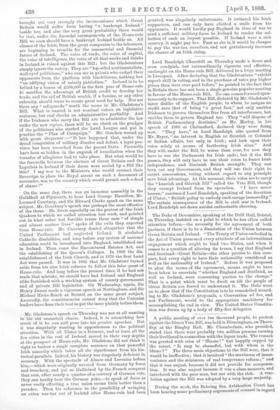Mr. Goschen, in a great speech at Glasgow on Tuesday,
brought out very strongly the inconvenience which Great Britain would suffer from having "a bankrupt Ireland" beside her, and also the very great probability there would be that, under the financial arrangements of the Home-rule Bill, we soon should have a bankrupt Ireland beside us. All classes of the Irish, from the great companies to the labourers, are beginning to tremble for the commercial and financial future of Ireland. The voice of trade, the voice of capital, the voice of intelligence, the voice of all that works and thinks in Ireland is raised against this Bill ; but the Gladstonians simply ignore the outcry. They are " lop-sided sentimentalists, wall-eyed politicians," who can see in priests who cudgel their opponents from the platform with blackthorns, nothing but " an edifying vision of saintly patriotism." Ireland is to be bribed by a bonus of £500,000 in the first year of Home-rule to sacrifice the advantage of British credit to develop her trade, and the aid of British wealth, if a famine, or any other calamity, should occur to create great need for help. Nor are there any " safeguards " worth the name in Mr. Gladstone's Bill. What is wanted is not nominal vetoes on legislative rashness, but real checks on administrative partiality. And if the Irishmen who carry the Bill are to administer the law under the new regime, there will be no check on the grudges of the politicians who started the Land League and put in practice the " Plan of Campaign." Mr. Goschen wound up with great eloquence :—" It has happened that, under the dread compulsion of military disaster and defeat, a loyal pro- vince has been wrenched from the parent State. Farewells have been so bidden in the anguish of humiliation when the transfer of allegiance bad to take place. But what would be the farewells between the electors of Great Britain and the Loyalists in Ireland if their doom were sealed by a Bill like this P I say woe to the Ministers who would counsel their Sovereign to place the Royal assent on such a document of surrender, woe to the country which would permit such a deed of shame 1"



































